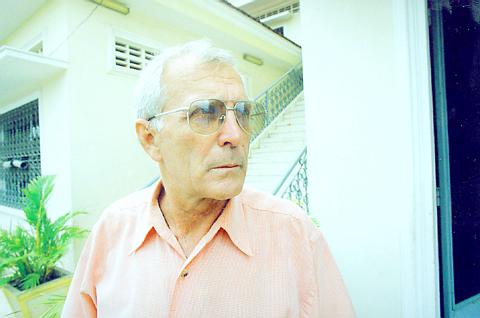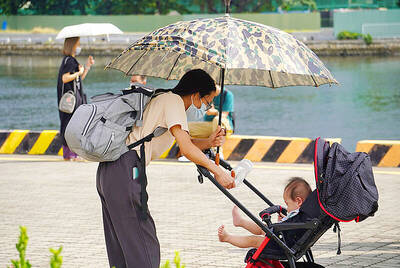Nothing had prepared Francois Ponchaud for his first glimpse of the nature of the Khmer Rouge's new order imposed on Phnom Penh in the immediate aftermath of the fall of the Cambodian capital on April 17, 1975.
In spite of the horrors borne from a decade of watching Cambodian society descend rapidly into a vicious downward spiral of violent civil conflict, the bizarre events unfolding in the street in front of the Jesuit missionary's residence appeared to defy all belief.
"Around one in the afternoon ... a hallucinatory spectacle began. Thousands of the sick and wounded were abandoning the city. The strongest dragged pitifully along, others were carried by friends, and some were lying on beds pushed by their families, with their plasma and IV bumping alongside. That s how the first evacuees left, about twenty thousand of them."

PHOTO: DANA LANGLOIS
The depopulating of Phnom Penh, which was to be followed in the days that followed by the forced evacuation of Cambodia's other urban centers, was the first indication that the worst was far from over for Cambodia and its people.
The stark images of Phnom Penh's 2.5 million residents being led out of the city at gunpoint by unsmiling, black-clad Khmer Rouge fighters who killed any and all who dared question their intentions dealt a decisive blow to the hopes shared by Ponchaud and other foreign residents and observers of Cambodia who had anticipated a Khmer Rouge victory as a deliverance from the corrupt brutality of Lon Nol's Khmer Republic.
"The evacuation was a stupidity ... a useless suffering for many, many people," Ponchaud recalled in an interview with the Taipei Times last week. "When the Khmer Rouge forced old people out [of Phnom Penh], I couldn't support it."
The evacuations -- the first step in the Khmer Rouge's attempt to transform Cambodia into a "hyper-Maoist" agrarian utopia that would eventually kill more than 1.5 million people -- came as a shock to Ponchaud, who had assumed that the desperate conditions endured by Cambodians under the Lon Nol regime could only improve under the KR.
"The Lon Nol regime [1970-1975] was very, very corrupt and there was no hope for the people ... the only hope was the coming of the Khmer Rouge," Ponchaud said. "We'd known since 1970 that when the Khmer Rouge [captured] a village, the killed the village chief, redistributed the land and took people to the forest, but we thought it was an effect of the war and when [the Khmer Rouge] had victory [their methods] would change."
Expelled from Cambodia after a harrowing three weeks of confinement to the grounds of Phnom Penh's French Embassy, Ponchaud did not have to wait long before accounts of the murderous reality of Democratic Kampuchea reached him through refugees who'd fled over the border.
"When in France I heard accounts of atrocities [by the Khmer Rouge], at first I didn't believe them," he said. "But later there were so many, and so similar in the details that I had to believe."
Ponchaud was moved to compile the stories of widespread murder and starvation in Democratic Kampuchea in a marathon three month writing session that produced Cambodia Year Zero.
Published in 1977 , Year Zero
was the first and most influential expose of the horror that everyday life in Cambodia had become under the Khmer Rouge.
"The book was written as an expression of solidarity with the Cambodian people who were suffering, but I had no hope that [the book] would change anything," he said. "The stories the refugees told me [in camps along
the Thai-Cambodian border] were terrifying, but the testimony I chose was not too horrific because I knew if it was too terrifying, Europeans simply would not believe it."
Ponchaud's Year Zero was influential in helping to reverse the reflexive expressions of support and sympathy the Khmer Rouge takeover evinced from left-leaning western intellectuals.
"Noam Chomsky [at the time] was very favorable to the Khmer Rouge and the Vietnamese communists, but when he read the book he said `I don't understand the Khmer Rouge," Ponchaud said. "Also in France many [leftist] writers changed their minds about the KR [after reading Year
Zero]."
Similarly unforeseen was the exploitation of Year Zero as a propaganda tool by the Vietnamese, a circumstance that led Ponchaud to cancel a planned second printing of the book in 1979.
"In 1978 when the Vietnamese were preparing the invasion or `liberation'
[of Cambodia], they translated the book into Vietnamese and read it on Hanoi Radio," Ponchaud said, shaking his head ruefully.
"So you see, I helped with the Vietnamese invasion."
While unequivocal in his condemnation of the outrages of Democratic Kampuchea, Ponchaud is equally adamant in assigning guilt to western leaders who aided and abetted the destruction of Cambodia and the rise and sustenance of the KR.
When asked in 1983 by the head of Amnesty International to participate in an eventual genocide tribunal of Pol Pot, Ponchaud agreed, but on one condition.
"Before Pol Pot I said we must judge Nixon and Kissinger and Carter ... they are bigger killers than Pol Pot," he insisted. "They destroyed Cambodia with their B52s and [beginning] in Jan 1979 supplied the Khmer Rouge and gave them money to fight the Vietnamese."
Ponchaud is also clearly distressed by the haunting parallels between contemporary Cambodia and the endemic corruption and widespread misery of Cambodians under the old Lon Nol regime.
"In my opinion, the Lon Nol regime was not worse than [modern Cambodia] ... in the Lon Nol period I never saw mothers sell their children the way mothers are forced to do nowadays," he said.
"The [current] government is lucky that the present ideological environment is different
[because] if the ideological environment was the same as it was in Cambodia in 1970, there[d be revolution now."
The implications of a possible tribunal for former Khmer Rouge leaders is also a source of concern for Ponchaud.
"If you want to judge the KR, I agree but you must judge all the KR including the [former] KR in power now, such as Prime Minister Hun Sen and you must also judge the people who killed 17 people on March 30, 1977," he said, in reference to the grenade attack on a Sam Rainsy Party demonstration outside Cambodia's National Assembly widely believed to have been perpetrated by bodyguards of Cambodian Prime Minister Hun Sen.
"But if you judge the acting leaders, there could be trouble, so maybe it's best to be quiet ... it may be impossible to find justice because sthere are too many people involved."

Taiwanese Olympic badminton men’s doubles gold medalist Wang Chi-lin (王齊麟) and his new partner, Chiu Hsiang-chieh (邱相榤), clinched the men’s doubles title at the Yonex Taipei Open yesterday, becoming the second Taiwanese team to win a title in the tournament. Ranked 19th in the world, the Taiwanese duo defeated Kang Min-hyuk and Ki Dong-ju of South Korea 21-18, 21-15 in a pulsating 43-minute final to clinch their first doubles title after teaming up last year. Wang, the men’s doubles gold medalist at the 2020 and 2024 Olympics, partnered with Chiu in August last year after the retirement of his teammate Lee Yang

FALSE DOCUMENTS? Actor William Liao said he was ‘voluntarily cooperating’ with police after a suspect was accused of helping to produce false medical certificates Police yesterday questioned at least six entertainers amid allegations of evasion of compulsory military service, with Lee Chuan (李銓), a member of boy band Choc7 (超克7), and actor Daniel Chen (陳大天) among those summoned. The New Taipei City District Prosecutors’ Office in January launched an investigation into a group that was allegedly helping men dodge compulsory military service using falsified medical documents. Actor Darren Wang (王大陸) has been accused of being one of the group’s clients. As the investigation expanded, investigators at New Taipei City’s Yonghe Precinct said that other entertainers commissioned the group to obtain false documents. The main suspect, a man surnamed

US Secretary of the Treasury Scott Bessent and US Trade Representative Jamieson Greer began talks with high-ranking Chinese officials in Switzerland yesterday aiming to de-escalate a dispute that threatens to cut off trade between the world’s two biggest economies and damage the global economy. The US delegation has begun meetings in Geneva with a Chinese delegation led by Chinese Vice Premier He Lifeng (何立峰), Xinhua News Agency said. Diplomats from both sides also confirmed that the talks have begun, but spoke anonymously and the exact location of the talks was not made public. Prospects for a major breakthrough appear dim, but there is

The number of births in Taiwan fell to an all-time monthly low last month, while the population declined for the 16th consecutive month, Ministry of the Interior data released on Friday showed. The number of newborns totaled 8,684, which is 704 births fewer than in March and the lowest monthly figure on record, the ministry said. That is equivalent to roughly one baby born every five minutes and an annual crude birthrate of 4.52 per 1,000 people, the ministry added. Meanwhile, 17,205 deaths were recorded, resulting in a natural population decrease of 8,521, the data showed. More people are also leaving Taiwan, with net